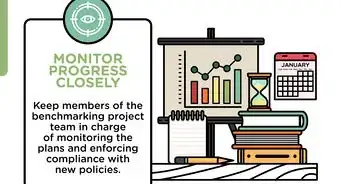This article was co-authored by Devin Jones. Devin Jones is the creator of “The Soul Career," an online career incubator for women. She is certified in the CliftonStrengths assessment and works with women to clarify their purpose and create meaningful careers. Devin received her BA from Stanford University in 2013.
wikiHow marks an article as reader-approved once it receives enough positive feedback. In this case, several readers have written to tell us that this article was helpful to them, earning it our reader-approved status.
This article has been viewed 278,199 times.
At the very center of having a successful career is behaving professionally. Perhaps you are fresh out of college looking to learn the ropes or maybe you’re just looking to become a better employee overall. No matter your reasoning, you can behave professionally by arriving to work prepared, having good morals, and honing your skills.
Steps
Being Polished and Prepared
-
1Arrive five minutes early each day. Don’t be that employee who’s barely making it in the door at 8:00AM or the one who regularly comes fifteen minutes late. Get up early in the mornings so you can arrive to work early; this will show that you are dedicated to your job.[1]
- Don’t rush out at 5PM, either. Stay a few minutes afterwards to check emails or finish up tasks.
-
2Dress well and maintain good hygiene. In addition to punctuality, professional dress is very important.[2] Invest in a few good outfits for work. Iron your clothes the night before so that you aren’t rushed and wrinkled in the morning. Shower daily and keep your hair well-kempt and out of your face.[3]
- Professional dress can include long-sleeved button-up shirts, slacks or skirts, blazers, cardigans, and loafers. Find clothes that fit you well so you look neat - stay away from clothes that are too tight or baggy.
- Pay attention to how your coworkers dress. Each company has its own definition of professional dress. For example, if everyone is wearing khakis and button-down shirts, don’t show up in a suit everyday. Blend into the company’s dress culture.
- You're better off overdressing than underdressing.[4]
Advertisement -
3Keep organized. Keep your desk, cubicle or office space neat and clean. Put documents in drawers or filing cabinets and organize them based on project type and year. Keep a calendar to keep track of your appointments, meetings, and projects.[5]
-
4Stay updated on your emails and voicemails. Be the employee that responds to emails in a timely fashion, with no more than two days in between a response. Respond to emails from your boss or superiors as soon as possible. Reread all emails before sending to check for typos.[6]
- Respond to emails in a professional manner, even if the sender writes to you casually.
- Make your voicemail message professional, as well. If you promise to respond to calls in a certain window, be sure to follow through on that promise. Additionally, be sure to check your voicemail regularly.
-
5Be an excellent communicator. Stay on topic when delivering information and keep your updates as succinct as possible, avoiding unnecessary information. When in doubt about information or instructions, ask open-ended questions. You can say something like “Just to make sure I understand, can you give me an example?”[7]
- Maintain good eye contact and stand or sit straight up. Having good posture portrays confidence.
- Do not use slang.
- Limit how often you say “like," “um," "uh," and related sounds.
- Don't participate in office gossip.
- Keep discussions about your personal life to a minimum while at work.
-
6Practice presentations in advance. If you have to present your work to your colleagues or some other audience, be ready. Create a slideshow and have notes on hand to refresh your memory. Practice several times in advance to prepare a polished presentation, calm your nerves, and ensure that you’re prepared for questions.
-
7Come to meetings with notes prepared. If you have a staff meeting or other meeting coming up, come with notes prepared. You may have to share updates about your projects; have those updates written down so you can share them accurately.
- Have questions on hand, as well.
Being Ethical at Work
-
1Follow company policies. Take some time to read your company’s manual to make sure that you are following all of the rules. If you think you are in violation of any of these rules, consult with your boss.[8]
- For instance, perhaps you are in a relationship with a coworker. If this is against company policy, you need to inform your supervisor and end the relationship or else find another job.
-
2Keep your private life private. At work, avoid discussing intimate details about your life with your coworkers. Keep discussion of sex and fights with your partner off the table completely.[9]
- Create friendships at work, but keep your discussions light while in the office. Check in with your coworkers regularly, go out to lunch together, and discuss things like vacations, TV shows, your kids, or your hometown.
-
3Be a dependable and reliable employee. If you tell your boss that you will go to a meeting in her place, go. This will help to establish trust between you and others. Keep all of your meetings and appointments unless something serious, like an illness, comes up to change them. Complete all of your projects before they are due and to the best of your ability.[10]
- Do not over-commit to too many tasks or volunteer to do tasks that you are not qualified to do.
- Admit when you don't know something or if you don't feel like you can handle it.
-
4Apologize when you make a mistake. Even if you are a model employee, you are bound to slip up from time to time. When this happens, don’t shift the blame to others but take full responsibility instead. Apologize for the errors you made and put steps in place to avoid them in the future.[11]
- You might say “I’m so sorry for missing that meeting with the pharmaceutical company. I accidentally double booked myself that day. I have rescheduled the meeting for tomorrow. I’ll make sure this doesn’t happen again.”
-
5Keep out of office gossip. Even when others in the office are badmouthing people, keep out of it. Don’t involve yourself in people’s pettiness or else you could find yourself in trouble. When gossip comes up, try to change the subject or walk away.[12]
-
6Be honest with your coworkers and bosses. Honesty is a very important element of professionalism. Always tell the people you work with the truth about your projects and be comfortable saying “I don’t know”, but not with finality/resignation. Be prepared to find what is needed. Let others know when you need help such as a source, instructions, training or immediate help from someone who has a skill or the experience that is needed.[13]
- For instance, if your boss asks how a project that you’re struggling with is going, let your needs be known. Don’t deepen the problem by saying things are fine when you could really use a bit of help.
Developing Career-Related Skills
-
1Read articles related to your job to stay up to date. Each day, try to find at least one article related to your line of work to read. This will ensure that you are staying updated. You will also have new material to discuss with your coworkers in staff meetings.[14]
- For instance, if you work at a university, subscribe to online journals like The Chronicle of Higher Education or Inside Higher Ed for daily emails.
-
2Attend trainings in your field. Many offices will pay for their employees to go to trainings or conferences related to their work. Look into some of these and put in a proposal with your boss to get funding to attend. These are great experiences for you to expand your knowledge.[15]
-
3Take notes in departmental meetings. When in meetings, avoid getting on your phone or drifting off. Instead, stay focused, listen, and take notes. Though they may be boring, there is likely some very important information being discussed that you can use to become a better professional.[16]
-
4Consider going back to school. Perhaps you are looking to extend your knowledge beyond a memo or a training. If this is the case, consider going back to school to get another degree in your field.[17]
- For instance, if you are a Licensed Practical Nurse (LPN), you might consider furthering your knowledge of nursing and becoming a Registered Nurse (RN). An increase in knowledge often comes with an increase in pay, as well.
Expert Q&A
-
QuestionWhat is professional work behavior?
 Devin JonesDevin Jones is the creator of “The Soul Career," an online career incubator for women. She is certified in the CliftonStrengths assessment and works with women to clarify their purpose and create meaningful careers. Devin received her BA from Stanford University in 2013.
Devin JonesDevin Jones is the creator of “The Soul Career," an online career incubator for women. She is certified in the CliftonStrengths assessment and works with women to clarify their purpose and create meaningful careers. Devin received her BA from Stanford University in 2013.
Career Coach Professional work behavior involves being respectful and representing yourself in the best way possible. Keep in mind that professionalism might look different between separate organizations.
Professional work behavior involves being respectful and representing yourself in the best way possible. Keep in mind that professionalism might look different between separate organizations.
References
- ↑ https://www.monster.ca/career-advice/article/10-ways-to-be-professional-at-work-canada
- ↑ Devin Jones. Career Coach. Expert Interview. 5 April 2019.
- ↑ https://www.livecareer.com/career-tips/career-advice/professionalism
- ↑ Devin Jones. Career Coach. Expert Interview. 5 April 2019.
- ↑ https://www.livecareer.com/career-tips/career-advice/professionalism
- ↑ https://www.livecareer.com/career-tips/career-advice/professionalism
- ↑ https://www.forbes.com/sites/susanadams/2013/11/19/how-to-communicate-effectively-at-work-3/#1444d41a589f
- ↑ https://www.livecareer.com/career-tips/career-advice/professionalism
- ↑ https://www.monster.ca/career-advice/article/10-ways-to-be-professional-at-work-canada
- ↑ https://www.livecareer.com/career-tips/career-advice/professionalism
- ↑ https://www.livecareer.com/career-tips/career-advice/professionalism
- ↑ https://www.livecareer.com/career-tips/career-advice/professionalism
- ↑ https://www.monster.ca/career-advice/article/10-ways-to-be-professional-at-work-canada
- ↑ https://www.monster.ca/career-advice/article/10-ways-to-be-professional-at-work-canada
- ↑ https://www.monster.ca/career-advice/article/10-ways-to-be-professional-at-work-canada
- ↑ https://www.livecareer.com/career-tips/career-advice/professionalism
- ↑ https://www.monster.ca/career-advice/article/10-ways-to-be-professional-at-work-canada
About This Article
Behaving professionally in your job is all about having good relationships with your coworkers and staying on top of your work. Communication is a large part of being professional. Always be polite at work, make eye contact when you’re talking to people, and ask questions if you don’t understand something. Another part of being professional is being reliable whenever someone needs help or asks you to do something. If you make a mistake, take responsibility for it, apologize, and try to fix it. Your attitude is also a big part of professionalism. Try to arrive at work 5 minutes early and stay a few minutes after the end to make sure you’ve done everything you need to. Avoid talking about office gossip or personal issues at your job so you can focus on your work. For more advice from our co-author, including how to prepare for meetings and presentations, read on!
















































































